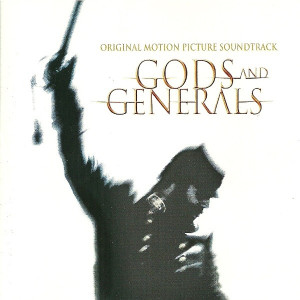 The epic film Gods and Generals was based on the novel of the same name by Jeff Shaara. It told the story of the War Between the States from 1861 til 1863, just before the battle of Gettysburg. Shaara had written his novel to serve as a prequel to his father’s classic tale The Killer Angels, which described that battle, and was filmed as Gettysburg. I haven’t seen the film, and in many cases this would limit my interest in the soundtrack. Soundtracks often serve mainly as an aural souvenir of a particularly thrilling motion picture experience. I’m not speaking of the new collections, which simply combine a dozen pop songs behind a reproduction of the film poster to create a kind of justified K-Tel anthology. No, I’m referring to the traditional soundtrack album — a presentation of the musical cues over which the action of the film took place. The sweeping grandeur of the Arabian desert is evoked in Maurice Jarre’s Lawrence of Arabia score; the action of the Indiana Jones trilogy is driven by the orchestral manoeuverings of John Williams; the powerful dramatic of Psycho is underpinned by Bernard Hermann’s music; each example a tribute to the composer’s art. Gods and Generals continues the tradition.
The epic film Gods and Generals was based on the novel of the same name by Jeff Shaara. It told the story of the War Between the States from 1861 til 1863, just before the battle of Gettysburg. Shaara had written his novel to serve as a prequel to his father’s classic tale The Killer Angels, which described that battle, and was filmed as Gettysburg. I haven’t seen the film, and in many cases this would limit my interest in the soundtrack. Soundtracks often serve mainly as an aural souvenir of a particularly thrilling motion picture experience. I’m not speaking of the new collections, which simply combine a dozen pop songs behind a reproduction of the film poster to create a kind of justified K-Tel anthology. No, I’m referring to the traditional soundtrack album — a presentation of the musical cues over which the action of the film took place. The sweeping grandeur of the Arabian desert is evoked in Maurice Jarre’s Lawrence of Arabia score; the action of the Indiana Jones trilogy is driven by the orchestral manoeuverings of John Williams; the powerful dramatic of Psycho is underpinned by Bernard Hermann’s music; each example a tribute to the composer’s art. Gods and Generals continues the tradition.
The album begins with the title song “Going Home,” sung by Mary Fahl. This tune introduces an Irish feel to the whole project. Fahl was lead singer for late, lamented, soon to be reformed October Project. This stunning lament is filled with tragic beauty and serves as a perfect opening to the album and film. Master fiddler Mark O’Connor assists, and reappears at several points during the album to provide a link through out the score.
The score was composed mainly by John Frizell. His sweeping orchestral vision echoes contemporary song, and well known themes from the United States of the mid-nineteenth century. Played by a studio orchestra, the tunes are sprightly, and then morose, depending on the cue they are to support. You will hear marches, dirges, and battle calls…just as you might see them visualized on screen. Paddy Moloney of the Chieftains, lends a hand playing tin whistle and uillean pipes on “The First Crop of Corn.” And then, to cap it off…a new folk song by Bob Dylan. “‘Cross the Green Mountain” features Dylan’s recent deep gravelly voice over a piano, accompanied by a tight band. Charlie Sexton and Larry Campbell each add guitar and violin, Benmont Tench plays organ, Tony Garnier plays bass and George Recile drums. It is a slow contemplative piece, in keeping with the meditative mood of the previous orchestral tracks.
Early copies of the album were issued with a bonus DVD. The Dylan song is presented with clips of the film intercut with footage of Dylan walking through the set. It is strangely effective. Similar editing is used for the Mary Fahl song. Both of these videos make fine listening, and interesting viewing. Also included on the DVD is the theatrical trailer, for fans of film archives, and some scenes deleted from the theatrical run of the film. The trailer is a typical thirty second synopsis of a three hour film, but acts as a powerful introduction. Deleted scenes are a mixed blessing. Usually there is a reason they were not included in the final cut. Often it is because they slowed a film down. While the six scenes included here are interesting to have as souvenirs, one wonders what they would have added to the film. They each feature songs, and so fit well with the two music videos. As a bonus, the almost half hour of footage on this free DVD is an attractive enticement for the collector.
An altogether useful package then, is this Gods and Generals soundtrack. A couple of fine tunes by artists whom we here at Green Man are fond of; some moving and evocative orchestral pieces; the involvement of Mark O’Connor and Paddy Moloney and a collection of video material to add to our collection. Not an everyday listen, but one I am glad to have in my library.
(Sony Classical, 2003)
